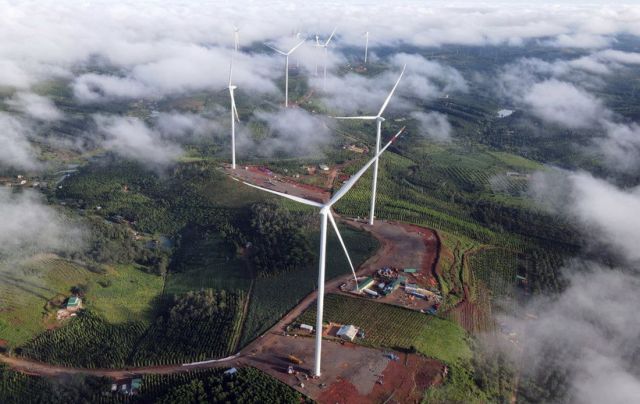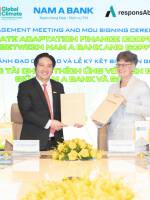
Việt Nam is accelerating efforts to build a carbon market, viewing it as an essential tool for reducing emissions, improving competitiveness and ensuring the country’s long-term transition to a low-carbon economy.
Officials and economists stress that establishing a well-regulated market — one that prioritises high-quality credits over cheap volume — is vital for protecting national credibility and achieving sustainable growth.
A policy dialogue titled ‘Orientation of the Global and Vietnam Carbon Market: Insights after COP30 and the Way Forward‘ was held on the topic in Hà Nội on 25 Nov.
Speaking at the dialogue, Deputy Director General of the Department of Climate Change under the Ministry of Natural Resources and Environment Nguyễn Tuấn Quang said the world was moving toward carbon-pricing mechanisms.
“In recent years, global trends show that carbon pricing tools, such as carbon markets and carbon taxes, have become increasingly common and influential, helping countries reduce greenhouse gas emissions and pursue green growth,” he said.
Quang cited the World Bank’s 2025 State and Trends of Carbon Pricing report, which shows that carbon pricing systems now cover more than 20 per cent of global emissions and generate over US$100 billion each year for green transition efforts.
He noted that such tools were becoming foundational to modern economic policy, adding that Việt Nam could not afford to fall behind.
To prepare for its own market, the Government is building a comprehensive legal framework and a clear roadmap. A pilot carbon market will operate until 2028, followed by a full official market from 2029, aligned with international systems.
To make this possible, the Ministry of Natural Resources and Environment is drafting two key decrees: one on international transfer of greenhouse gas mitigation outcomes and carbon credits, and another on forest-based carbon absorption and storage services.
Both will be submitted to the Government in December. The Ministry of Finance has also submitted a draft decree on establishing a domestic carbon exchange.
Quang stressed that Việt Nam’s priority would not be rapid trading volume, but building a credible, effective market.
“Việt Nam should not chase cheap, low-quality credits. We should prioritise credit quality to safeguard national credibility and interests,” he said. A strong, transparent market would help shift the country’s growth model toward low emissions and strengthen its position in global supply chains, he added.
Throughout the dialogue, experts highlighted why Việt Nam must move quickly. The first sessions examined the country’s current legal framework, global shifts after COP30 and the opportunities and challenges of operating a carbon market – including how the private sector can participate.
Later sessions focused on long-term planning, Việt Nam’s forest carbon potential and international experience from Canada, Africa, Indonesia, the Philippines and Australia.
Professor Phạm Thu Thủy from Flinders University noted that Việt Nam already had valuable lessons from early pilot programmes, but must now turn them into concrete policy action. She emphasised the need for coordination across sectors such as agriculture, forestry, energy, finance, tourism and conservation, along with scientific approaches that integrate AI, data and community knowledge.
Country Director of CARE in Vietnam Lê Kim Dung said that establishing the carbon market must also ensure fairness and inclusion, especially for women and ethnic communities that depend on natural resources.
International partners echoed strong support.
Canada’s Ambassador to Việt Nam Jim Nickel reaffirmed that carbon markets would be a key tool for achieving net zero emissions, adding that the dialogue offered an important platform for sharing practical experience and identifying solutions suited to Việt Nam’s conditions, ensuring that economic growth would go hand in hand with environmental protection.
Associate Professor Lê Trung Thành, rector of the University of Economics under Vietnam National University Hà Nội, which organised the dialogue, said global climate efforts were strengthening rapidly.
Following COP30, he noted, carbon markets were entering a new phase, and Việt Nam must establish its own market to stay aligned with international rules and expectations.
The two-day dialogue includes five sessions exploring forest carbon pricing, safeguards, gender and social inclusion and the development of Việt Nam’s carbon market.
It aims to attract private investment — including from Canada and other global partners — and expand cooperation in carbon and forestry, as Việt Nam prepares to build a fully functioning carbon market.
(VNS)





